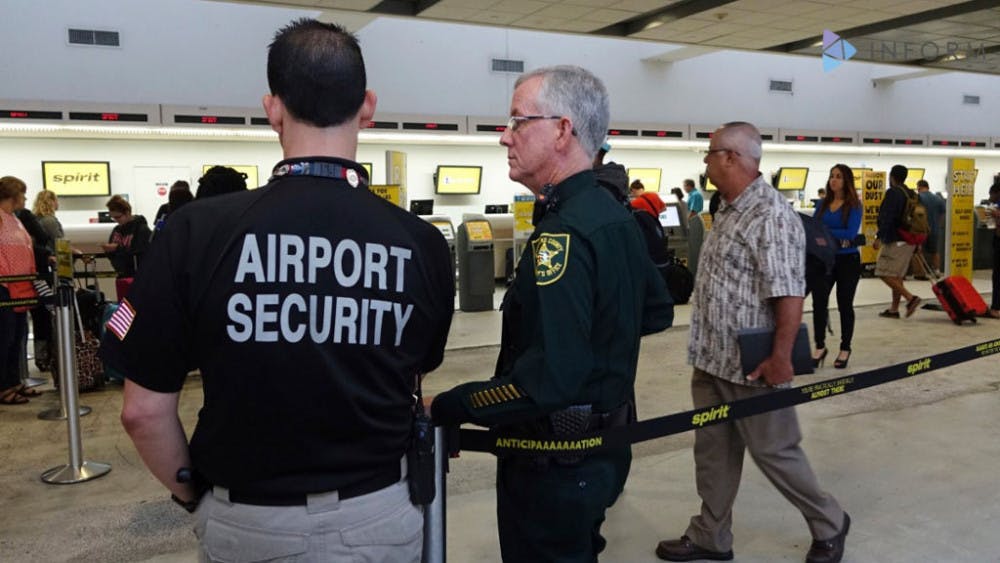A new travel ban is set to take effect on October 18th.
This Semester, IU is exploring ‘Diversity, Difference and Otherness’ in a complex world. Yet as we seek to include and understand, the Trump administration is in the process of signing a new executive order which will limit those who can seek refuge in our country.
The third –and likely final ban will be signed as an executive order amid heightened national and global tensions.
Earlier this year, President Trump signed his first and second travel bans as executive orders, and twice this year they were enjoined by lower federal courts across the united states.
The previous orders were ruled unconstitutional for being discriminatory on religious grounds.
The countries they blacklisted were all predominantly Muslim.
Diana Nabulsi, a fifth-year student at IU said “having a president that enforces a travel ban that mainly targets Muslims is kind of discouraging when my family from the Middle East have dreams to pursue a better future with better opportunities in America and now they can’t.”
The first ban, which was signed in January, was met with international backlash and immediate pushback from courts all over the country for targeting only Muslim-majority countries.
Had the ban succeeded, citizens of the seven countries who had a valid visa or green card likely would have been deported.
Refugees from the countries listed in the order would have been banned from entering the country for 120 days.
For Syrian refugees, the 120-day exclusion would have been indefinite.
The second ban was signed as an executive order on March 6th after the first order was deemed invalid. In this revised order, the reason for the ban was amended from religious grounds to a concern for national security.
Again it was challenged by judges across the country, but when it reached the Supreme Court, the injunctions imposed by the lower courts were invalidated by a 6-3 vote.
An exemption was carved out to allow refugees and immigrants from the banned countries who had bona-fide relationships in the U.S to be able to enter the country.
A “Bona-Fide relationship” is defined here as any family relationship, job offer or university admission. Refugee resettlement programs were also considered to be “bona-fide” until the department of Justice appealed this to the supreme court and it was removed from the definition.
Now, that order is expiring. As of today, there will be 19 days without a ban and On October 18th, a new order will be signed.
This time, it’s serious.
The new ban is much more sophisticated than its predecessors. Addressing the shortcomings of the other two, this order includes non-Muslim countries such as Venezuela and North Korea. The other countries: Chad, Iran, Libya, Syria, Yemen and Somalia are all Muslim-majority countries. Sudan was dropped from the list.
Speaking about his relatives in Somalia, undergraduate Mohamed Abdirisak said “It’s very difficult for people to come here”. He added that after the bans, his family in Somalia can no longer travel to the United States.
IU is home to a diverse student body representing more than 100 countries. Many of these students now have to decide whether or not to go home and risk not being able to come back.
Professor Asma Afsaruddin teaches Islamic Studies in the department of Near Eastern Languages and Cultures at IU and she is concerned about her students.
“We have a number of students from the middle east and we are concerned about their ability to return to their country”, she said. “Especially if they want to go home for the summer and come back all energized for the new fall semester. They just are not able to do that”.
Afsaruddin added that she has colleagues who are also affected by the ban.
“This is a matter of conscience for most of us”, she said.
The inclusion of Venezuela and North Korea to the ban are confusing.
“Hardly anyone from North Korea travels to the United states so it’s a moot point to include them,“ Afsaruddin said. I think it’s a way of fending off the very scathing criticism this administration’s faced on account of instituting what had been pretty much an exclusively Muslim travel ban.”
Other Bloomington residents shared this sentiment. “There’s not a huge amount of refugees trying to come in from North Korea” said Nabulsi. “He’s just trying to prevent refugees from Syria from coming in because he thinks they’re all dangerous.”
Venezuela’s foreign ministry responded to Trump administration’s order on Monday. CNN reported that the Ministry said “These types of lists … are incompatible with international law and constitute in themselves a form of psychological and political terrorism.”
However, the Supreme Court has upheld the order.
When the order goes into effect this month, Syria will see the harshest restrictions.
Immigrants and non-immigrants alike from Syria and North Korea will be barred from entering the United States.
In Chad, Yemen, and Libya, some business and tourist visas will be suspended for both immigrants and tourists. Non-immigrants from Somalia and Iran are suspended from traveling to the United States. Iranians with valid student-visas are excepted, but will face enhanced screening. For Venezuela, a country currently struggling with rampant inflation and a collapsed economy, it concerns only certain government officials and their immediate family members.
Addressing the implications of these bans, Abdirisak said “I feel like people need to get to know other cultures better, and break down those mental walls. Just try to sit down, break bread with people, get to know them for who they are and I think the world would be a better place.”





